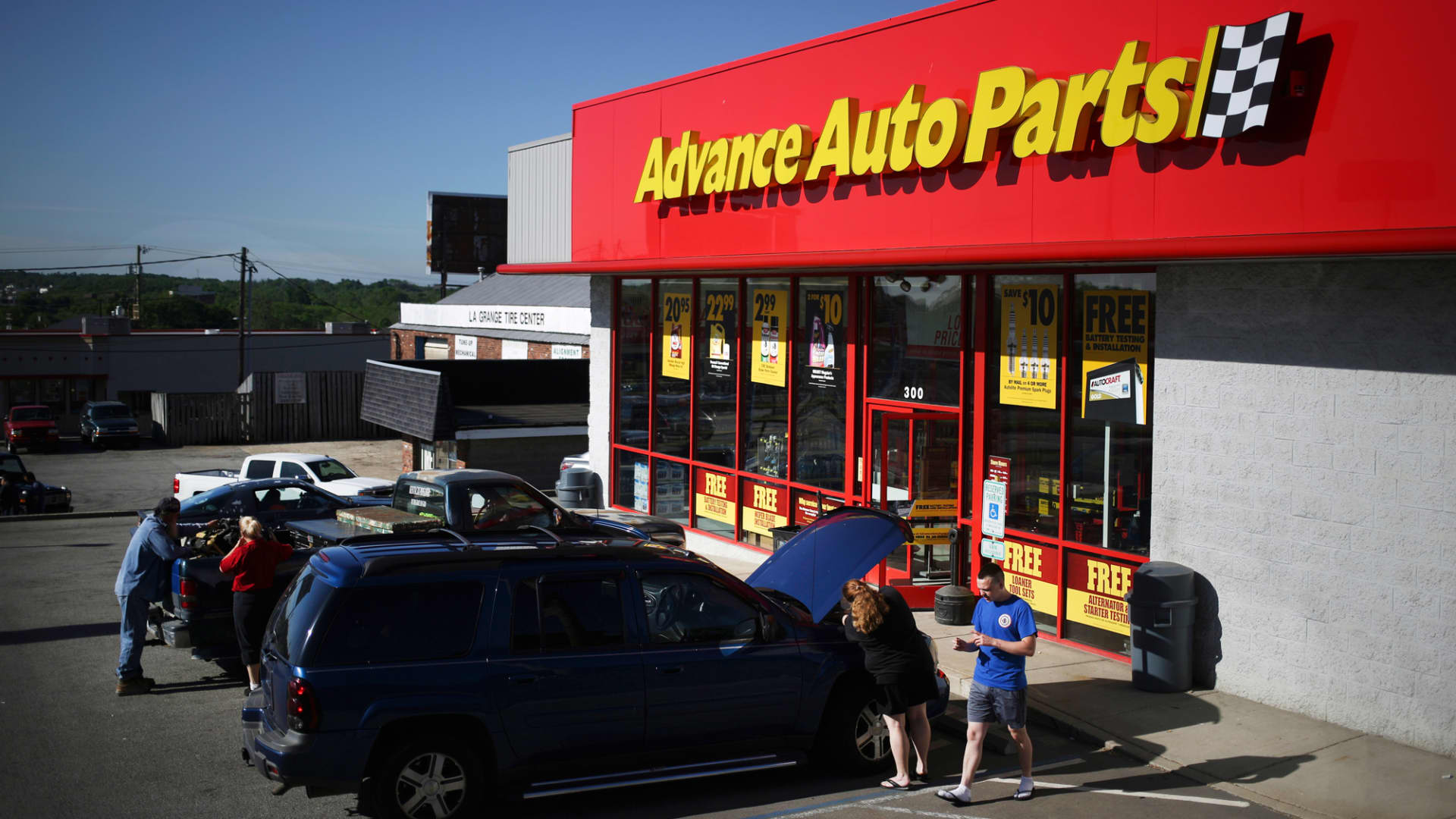
Customer vehicles sit parked outside an Advance Auto Parts automotive supply store in La Grange, Kentucky.
Luke Sharrett | Bloomberg | Getty Images
Shares of Advance Auto Parts suffered their worst day of trading on record Wednesday after the company’s fiscal first-quarter earnings significantly missed Wall Street’s expectations and executives slashed the retailer’s yearly guidance and quarterly dividend.
The Raleigh, North Carolina-based auto parts supplier blamed its dismal results and bleaker outlook on higher-than-expected costs for its professional sales, inflationary pressure, supply chain problems and an unfavorable product mix.
Share of the company plummeted 35% on Wednesday to close at $72.89. It marked the largest daily decline ever for the company since it went public in 2001 and the lowest closing price since February 2013.
The company’s earnings per share for the period came in at just 72 cents, compared with an expected $2.57 per share, according to average analyst estimates compiled by Refinitiv. Its quarterly revenue of $3.42 billion slightly missed expectations of $3.43 billion.
“We expect the competitive dynamics we faced in the first quarter to continue, resulting in a shortfall to our 2023 expectations. We have reduced our full-year guidance and our board of directors made the difficult decision to reduce our quarterly dividend,” CEO Tom Greco said in a statement.
Shares of other auto parts suppliers such as O’Reilly Automotive and AutoZone were also lower Wednesday. However, some Wall Street analysts believe Advanced Auto Parts’ problems could be more operational than industrywide.
“In our view, AAP issues are, likely, largely its own, and could suggest improved market share opportunities for Outperform-rated AutoZone (AZO) and O’Reilly Auto (ORLY),” Oppenheimer analyst Brian Nagel said in an investor note Wednesday.

Shares of Advance Auto Parts since the company’s shares peaked in early January 2022 at more than $244 per share during intraday trading.
In its quarterly release, Advance Auto Parts declared a dividend of 25 cents per share to be paid out in July. In its prior-quarter earnings, Advance Auto Parts declared a dividend of $1.50 per share.
The company also cut its full-year profit outlook and now expects earnings per share of between $6 and $6.50, down from a previously stated range of $10.20 to $11.20. That’s despite lowering its net sales expectations by a range of just $200 million to $300 million, signaling operational problems with margins.
For the first quarter, the company’s net sales rose 1.3% to $3.4 billion compared with a year ago. Its gross profit declined by 2.4% to $1.5 billion.
Net income for the period was $42.7 million, or 72 cents per share, down from $139.8 million, or, $2.28 per share, a year earlier.
“While we anticipated the first quarter would be challenging, our results were below our expectations,” Greco said.
Shares of auto parts suppliers greatly benefited in recent years amid inflated prices of new and used vehicles due to tight supplies. Tight inventories and higher prices, resulting from production stoppages from the coronavirus pandemic and supply chain issues, led many car owners to keep their vehicles for longer, meaning more repairs and maintenance.
Shares of Advance Auto Parts peaked at more than $244 per share in January 2022. They’ve steadily declined since then.
“We have followed AAP and the auto parts retail sector for many years. We have consistently maintained the view that underlying, likely structural issues impact the AAP business model and prevent even solid operational teams from driving sustained sales and profit expansion at the chain,” Nagel said.
UBS analyst Michael Lasser, in an investor note Wednesday, said Advance Auto Parts’ results “reflect the challenges of trying to catch up in an industry that is competitive and filled with good operators.”
– CNBC’s Michael Bloom contributed to this report.
Correction: Average analyst estimates were compiled by Refinitiv. An earlier version misspelled the firm’s name.







